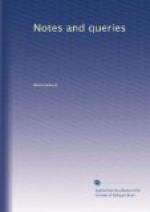“Est aqua lenis, et
est aqua dulcis, et est aqua clara,
Tu praecellis
aquam, nam leni lenior es tu,
Dulci dulcior es tu, clara
clarior es tu;
Mente quidem lenis,
re dulcis, sanguine clarus.”
Camden’s
MSS. Cott. Lib.
The learned Dr. Whitaker, in his History of Whalley, says, that “the word Paslew was of Norman origin (Pass-le-eau), and afforded a subject for some rhyming monkish verses, not devoid of ingenuity, which the curious reader may find in Weever’s Funeral Monuments, p. 645;” and a question now arises whether the Passellew mentioned by Fuller belongs to the same family as the “Paslews of Wiswall,” alluded to by Dr. Whitaker, one of whom, “John, Abbot of Whalley” was executed for the part he took in the “Pilgrimage of Grace.” when it is stated that the Paslews of Wiswall bore “Argent a fess between three mullets Sable pierced of the field, a crescent for difference,” probably some of your readers will be able to give some particulars respecting “Robert Passelew,” and also identify the families if possible.
T.W.
Burnley, Lancashire, Feb. 23, 1850.
* * * * *
MINOR QUERIES.
Conrad of Salisbury’s Descritio utriusque Britanniae.—A good many years since I had a communication from the Baron de Penhouet, a Breton Antiquary, respecting a work which I have never yet been able to discover. I may ascertain, through the medium of your very useful publication, whether there exists a work under the title of a “Descriptio utriusque Britanniae,” by Conrad of Salisbury, from a MS. of the time of Henry I. I should feel much obliged to any one who would favour me with this information.
JAMES LOGAN.
Peruse or Pervise—Passage in Frith’s Works.—Your correspondent T.J. rightly conjectured that the peruse of a modern reprint of Frith was an error. I have been able since to consult two black-letter editions, and have found, as I suspected, “pervise” and “pervyse.”
If your same correspondent, or any other, can help me to correct, or to understand another erroneous clause in Russell’s edit. of Frith, vol. iii. p. 227., I shall be still further obliged.
It is probably meant for some old rule in logic, but is printed there, “Ab inferiori ad suis superius confuse distribue.” Foxe, however, has “suum” instead of “suis.”
H.W.
Cromlech.—I shall feel much obliged if any of your readers will kindly refer me to any authority for the use of the word Cromlech, prior to the sixteenth century, whether in the Welsh or English language.
JAS. H. TODD.
Trin. Coll. Dublin, Jan. 31, 1850.
Meaning of “Grummett."—A Constant Reader is desirous of addressing such of your correspondents as are well versed in maritime history,—Mr. Bolton Corney to wit,—on the following subject. In the early ages of our Navy there was a distinct rating, called “Grummett,” on board each man-of-war, and he was generally, as may be seen in the Cottonian MSS., placed after the “maryners and gonners.” Now, the reader will be highly obliged to any one who will trace the designation to its source, and give information as to what were the special duties of the Grummett, or Gromet.




